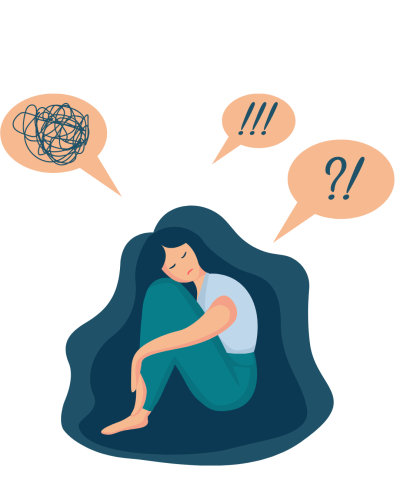
The common ideas people hold for psychotherapy come from stereotypical and misrepresented depictions in popular media, and culture. It can be difficult and confusing to decide if one’s problems need professional help. People may shy away from seeking help for being called weak. And at times acknowledging the concerns worth a consultation, evoke anxiety that pushes people to suffer in silence.
Let us help you understand what are the common reasons people have sorted psychotherapy for:
- Overwhelming Emotions – You see certain difficult emotions like anger, sadness, anxiety, shame, dysphoria, numbness and grief getting the better of you, coming in the way of your relationships, career and personal goals.
- Repetitive Thoughts – You find yourself stuck in a loop of uncontrollable, irrational and intrusive thoughts, images and impulses that can take the form of depressive ruminations (like thoughts of worthlessness, hopelessness and more) or obsessive ruminations ( thoughts of cleanliness, rechecking, blasphemy and more).
- Suffering related to traumatic experiences – You find yourself having flashbacks, nightmares associated with a trauma incidence or series of prolonged traumatic events. It can also come up in the form of bodily issues and many difficult feelings.
- Relational problems – You have been finding it difficult to either initiate or sustain relationships. These could also include concerns with unhealthy attachment patterns, incompatibility, poor communication, poor conflict resolution, fiction with in-laws, difficult in sexual intimacy, infedility, painful separation, parenting challenges and more.
- Psychoeducation and caregiving burden – You may be finding it difficult to sustain a caregiving role to someone who is chronically ill. You might be experiencing burnout. You will benefit from understanding the mental health issues, its management and engaging in self care.
- Psychosomatic Complaints – You may find your body expressing distress in the form of certain bodily symptoms that your doctors have ruled out any organic reasons for. These can include aches, and pains, stomach upsets, chronic fatigue, headaches and migraines etc.
- High Risk Behaviour – You are engaging in behaviours and habits that you feel are harmful for you – self harm, suicidal thoughts, risky sexual behaviour, implusive decision making and disorganized eating patterns. You might also be depending on unhealthy ways of coping with painful emotions like abusing alcohol and other mind altering harmful substances.
- Desire to be understood by someone – At times, all that you might be looking for to feel better is a safe space to talk yourself out without being judged. A therapist can become a symbolic figure of a sounding board, with whom you can safely park your feelings and feel a sense of cathartic release.
- Self Growth – You may be feeling too directionless, and find it hard to recognize or accomplish higher goals that add meaning and purpose to our lives. Therapy can be a space to explore and rekindle the spark by expanding your perspectives and horizons.
As a word of caution, this list is not an exhaustive list. If you don’t find your concerns listed here, pls book an appointment with a mental health professional to help you decide if you need help at this point for your concerns.
You may reach out to us to help you run if therapy is the right space for your concerns.
